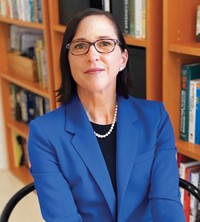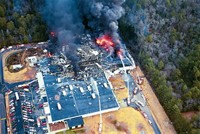Advertisement
Grab your lab coat. Let's get started
Welcome!
Welcome!
Create an account below to get 6 C&EN articles per month, receive newsletters and more - all free.
It seems this is your first time logging in online. Please enter the following information to continue.
As an ACS member you automatically get access to this site. All we need is few more details to create your reading experience.
Not you? Sign in with a different account.
Not you? Sign in with a different account.
ERROR 1
ERROR 1
ERROR 2
ERROR 2
ERROR 2
ERROR 2
ERROR 2
Password and Confirm password must match.
If you have an ACS member number, please enter it here so we can link this account to your membership. (optional)
ERROR 2
ACS values your privacy. By submitting your information, you are gaining access to C&EN and subscribing to our weekly newsletter. We use the information you provide to make your reading experience better, and we will never sell your data to third party members.
Industrial Safety
The Chemical Safety Board faces an uncertain future despite strong backing
Now down to two members, the board will have none come August
by Jeff Johnson, special to C&EN
January 30, 2020
| A version of this story appeared in
Volume 98, Issue 5

Representatives of the chemical industry, worker unions, and professional engineers, as well as senators from both parties, voiced support for the US Chemical Safety and Hazard Investigation Board (CSB) at a Senate oversight hearing Jan. 29.
Opinions at the Senate Environment and Public Works Committee hearing stood in sharp contrast to those of President Donald J. Trump, who has tried to defund and eliminate the CSB three times. So far, Congress has continued funding.
However, the board will shortly be down to one member—current Interim Executive Authority Kristen Kulinowski. Manny Ehrlich’s term expired in January, and Rick Engler’s term expires Feb. 6. Kulinowski’s term expires in August.
The board investigates chemically related industrial accidents to determine their root cause. As part of that effort, it provides advice and recommendations to companies, regulators, and others on how to avoid or at least mitigate accidents.
The CSB is unique in that it lacks regulatory authority; its only power is its ability to cast a bright light on cause. It was created 30 years ago after public criticism of US regulatory bodies’ ability to adequately investigate chemical accidents.
The CSB’s budget has never exceeded $12 million and its staff, including investigators, has barely topped 40. The board has also suffered from internal mismanagement. Still, it has produced more than 100 influential investigation reports and scores of educational safety videos. These products were lauded at the hearing.
Speakers from the American Chemistry Council (ACC), the chemical industry trade association; the United Steelworkers (USW), the primary union of chemical workers; and the American Institute of Chemical Engineers, a professional association, attested to the value of the CSB’s investigations and reports. They strongly urged adequate and continuous funding for the board and the appointment of a full slate of five members.
Chris Jahn, the ACC’s president and CEO, called the CSB findings a catalyst for safety improvements and noted that the council had led several industry initiatives to support and complement the board’s recommendations but not to replace it.
The USW’s Steve Sallman cited his union’s use of CSB products, particularly safety videos in worker training seminars. He called the board’s work a “bargain,” saying that the cost of a single accident can be as much as $32 billion.
The praise was overshadowed by the fact that without swift action, the CSB will soon have no members. Trump has nominated one new member, Katherine Lemos. Lemos cleared this committee last year on a unanimous vote, but her nomination has not been taken up by the full Senate. At the Jan. 29 hearing, Republicans and Democrats blamed each other for the delay.
The CSB currently has 12 active investigations that collectively resulted in 18 deaths.





Join the conversation
Contact the reporter
Submit a Letter to the Editor for publication
Engage with us on Twitter